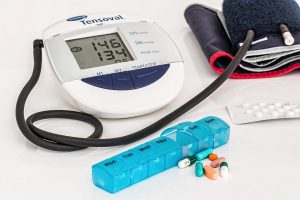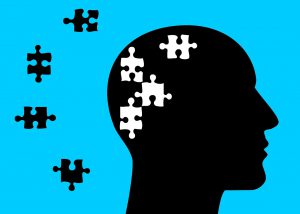The thought of aging can be scary for many people. They worry about things like worsening health conditions, limited abilities, or losing friends and family members. The things that people seem to fear the most are Alzheimer’s disease and other forms of dementia. According to studies, over half of Americans aged 50-80 are worried about developing one of these conditions.
While these conditions are serious – and scary – they are not an inevitable part of aging, and fixating on them too much can have a negative impact on your life. In fact, researchers at Heidelberg University’s department of Psychological Aging Research report that a frequent fear of dementia can cause people to feel less satisfied with their lives, and can negatively impact their ageing experience. Being informed, though, is always a good thing. Knowing the realities and risks of these conditions can help to calm your fears and remind you to take steps toward prevention.
The Facts

Alzheimer’s and other types of dementia are serious conditions that all affect cognitive function, but the terms are not interchangeable. Dementia is not a disease, but a syndrome: a cluster of symptoms, with multiple potential causes. Dementia is caused by damage to or loss of brain cells and nerve cells, due to genetic mutations, traumatic brain injury, or other diseases like Parkinson’s or Huntington’s disease. Depending on where in the brain the damage occurs, different symptoms can present. Symptoms of dementia include
- Memory loss
- Struggling to find words or to communicate
- Issues with spatial awareness and visual abilities, such as getting lost or not recognizing familiar places
- Difficulty with logic or problem solving
- Difficulty with planning and organizing
- Impaired coordination or motor function
- Confusion and disorientation, or even hallucinations
- Personality changes, such as depression, anger, or paranoia
Alzheimer’s is a disease that falls under the umbrella of dementia. While scientists and doctors are still not completely sure why people develop Alzheimer’s, they believe that it is caused by plaque and clumps of protein (known as “tangles”) damaging healthy neurons and neural connections, which results in dementia.

The Numbers
- Someone in the world is diagnosed with dementia every 3 seconds
- 58% of people with dementia live in developing countries
- 22% of all PCPs have not had residency training in dementia diagnosis and care
- 5.8 million people in the United States live with Alzheimer’s disease
- 81% of people with Alzheimer’s are age 85 or older
- Alzheimer’s disease is the 6th leading cause of death in the United States
The Risks
There are significant risk factors associated with dementia, though much about the syndrome is still unknown. People living in developing countries are at the greatest risk, but nobody really knows for sure why people in these countries suffer from dementia at a higher rate. In general, there are three risk factors that can’t be changed: age, because the risk increases exponentially after age 65; family history, as there seems to be a genetic connection; and Down syndrome, as many people with Down syndrome develop early onset Alzheimer’s disease. There are other risk factors, though, that we can work on, including:
- Diet: No specific diet is shown to reduce dementia risk, but research has found greater incidences of dementia in people with unhealthy diets as compared to those who follow diets rich in produce, whole grains, nuts, and seeds, like the Mediterranean diet.
- Exercise: Research shows that lack of exercise increases the risk of dementia.
- Alcohol use: Some studies have shown that moderate amounts of alcohol may have a protective effect against dementia, but also that excessive consumption of alcohol increases risk of dementia.

- Cardiovascular health: factors like high blood pressure, high cholesterol, atherosclerosis, or excess fats in your artery walls, and obesity all contribute to an elevated risk of dementia.
- Depression: While this connection is not yet well understood, there are studies that link late-life depression and dementia.
- Diabetes: Untreated or poorly controlled diabetes may increase dementia risk. Smoking: Smoking increases your risk of developing dementia and vascular diseases.
- Sleep apnea: People who snore and have episodes where they frequently stop breathing while asleep may have reversible memory loss.
- Vitamin and nutritional deficiencies. Low levels of vitamin D, vitamin B-6, vitamin B-12 and folate may increase your risk of dementia.
The Solution
The unfortunate reality is that there is no treatment for or way to reverse dementia and Alzheimers. There are, however, steps we can take earlier in life to help prevent these conditions. The researchers at Heidelberg University mention

ed above found that folks who were afraid of dementia were also likely to engage in positive preventative behaviors, such as:
- Keeping up with preventative screening and routine primary care visits
- Using “brain fitness” apps and games
- Consistently taking suggested supplements, like fish oil and antioxidants
- Exercising regularly
- Maintaining a health weight and eating a balanced diet
- Reducing high blood pressure and cholesterol
- Participating in an invigorating social life
All of these measures have been found to have some impact on dementia outcomes as well as to contribute to healthy aging.
Alzheimers and dementia are serious conditions. But this doesn’t mean that we have to live in fear. The overall incidence of dementia is low in this country, and many who develop the disease are able to live the rest of their life in comfort and joy. There are steps we can take to decrease the risk of dementia, and the first step starts with awareness and education. If you have concerns about your own health or that of a loved one, the first step is to talk with your trusted primary care physician and ask for a referral to a dementia specialist. A specialist can help evaluate your risk, recommend intervention and prevention strategies, and come up with a plan to keep you safe and healthy.











